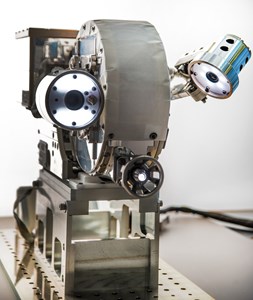Aug 14 2014
Medigus Ltd., a medical device company developing and commercializing micro-cameras and minimally invasive endosurgical tools and procedures, announced that the National Aeronautics and Space Administration (NASA) has incorporated Medigus' micro ScoutCam™ 1.2, the world's smallest camera, into its Visual Inspection Poseable Invertebrate Robot (VIPIR) tool.
VIPIR is a robotic, maneuverable, borescope inspection tool that is being tested as part of the Robotic Refueling Mission, an experiment on the International Space Station that has been demonstrating tools, technologies and techniques for on-orbit satellite servicing since 2011. micro ScoutCam™ 1.2 is being utilized as the borescope camera on VIPIR, a tool designed to provide unique visual inspection capabilities in space. The use of micro ScoutCam™ 1.2 fits under the previously established contract with NASA.
 NASA's Visual Inspection Poseable Invertebrate Robot (VIPIR)
NASA's Visual Inspection Poseable Invertebrate Robot (VIPIR)
"Our partnership with NASA is a powerful testament to the technological versatility of micro ScoutCam™ 1.2," said Chris Rowland, CEO, Medigus. "We are honored that our micro ScoutCam™ technology has been selected to help NASA successfully execute the next phase of their Robotic Refueling Mission."
As the smallest camera in the world, micro ScoutCam™ 1.2 is ideal for medical and industrial applications including gastroenterology, cardiology, urology, gynecology, dentistry, robotics, remote non-destructive testing (NDT) and micro-drilling inspection, among others. The micro ScoutCam™ 1.2's versatility is supported by key features including its miniature size, remarkable image quality, state of the art customizable optics, waterproof materials, and its adaptability in extreme temperatures.
VIPIR, incorporating the unique micro ScoutCam™ 1.2, launched to the International Space Station at the end of July, as part of second phase of NASA's Robotic Refueling Mission. Phase 1 of the investigation was successfully completed in May 2013.
"NASA is steadily maturing a set of robotic technologies that could help prolong the lives of satellites on orbit, thereby providing new capabilities for the Agency," said Benjamin Reed, deputy project manager of NASA's Satellite Servicing Capabilities Office. "Medigus' micro ScoutCam™ 1.2 met the requirements for VIPIR's borescope camera, and will demonstrate inspection capabilities once Robotic Refueling Mission operations begin."
"We are very excited about micro ScoutCam™ 1.2 being launched into outer space, as it truly showcases the camera's versatility and degree of possible applications," said Yaron Silberman, VP Sales and Marketing, Medigus. "We are very proud of our partnership with NASA and that our innovative micro ScoutCam™ technology meets NASA's needs."
About Medigus
Medigus is a medical device company specializing in developing minimally invasive endosurgical tools and highly innovative imaging solutions. Medigus is a pioneer developer of a unique proprietary endoscopic device, the MUSE™ system, to treat gastroesophageal reflux disease (GERD), one of the most common chronic diseases in the western world. As an expert in micro-endoscopic devices, Medigus has developed a range of micro CMOS (complementary metal-oxide semiconductor) and CCD (charge-coupled device) video cameras, including micro ScoutCam™ 1.2, which to the best of the company's knowledge, is the smallest in the world. These innovative cameras are suitable for both medical and industrial applications. The MUSE™ system incorporates Medigus' revolutionary micro ScoutCam™ technology. Based on its proprietary technologies, Medigus designs and manufactures endoscopy and micro camera systems for partner companies, including major players in the medical device and industrial industries. The company is committed to providing integrated solutions to meet all of its customer's imaging needs. Medigus is traded on the TASE (Tel Aviv Stock Exchange). To learn more about the company's advanced technology, please visit http://www.medigus.com/ or www.microscoutcam.com.
About micro ScoutCam™ 1.2
Medigus has developed a revolutionary 1.2mm-diameter CMOS (complementary metal-oxide semiconductor) camera – which to the best of the company's knowledge, is the smallest video camera in the world. This innovative camera is suitable for both medical and industrial applications. Centered around an advanced technology platform, micro ScoutCam™ 1.2 and Medigus' related endoscopic technologies have already been implemented in the following medical fields: Gastroenterology, Bronchoscopy, Cardiovascular, ENT, Urology, Gynecology, General Surgery, Orthopedics, Dental and NOTES (Natural Orifice Trans-luminal Endoscopic Surgery). The cameras are also in use at leading industrial companies in a variety of applications such as remote non-destructive testing (NDT), micro drilling inspection, cavities inspection, tube inspection and robotics.
About The National Aeronautics and Space Administration (NASA)
NASA's missions, programs and projects are ensuring the United States will remain the world's leader in space exploration and scientific discovery for years to come, while making critical advances in aerospace, technology development and aeronautics.